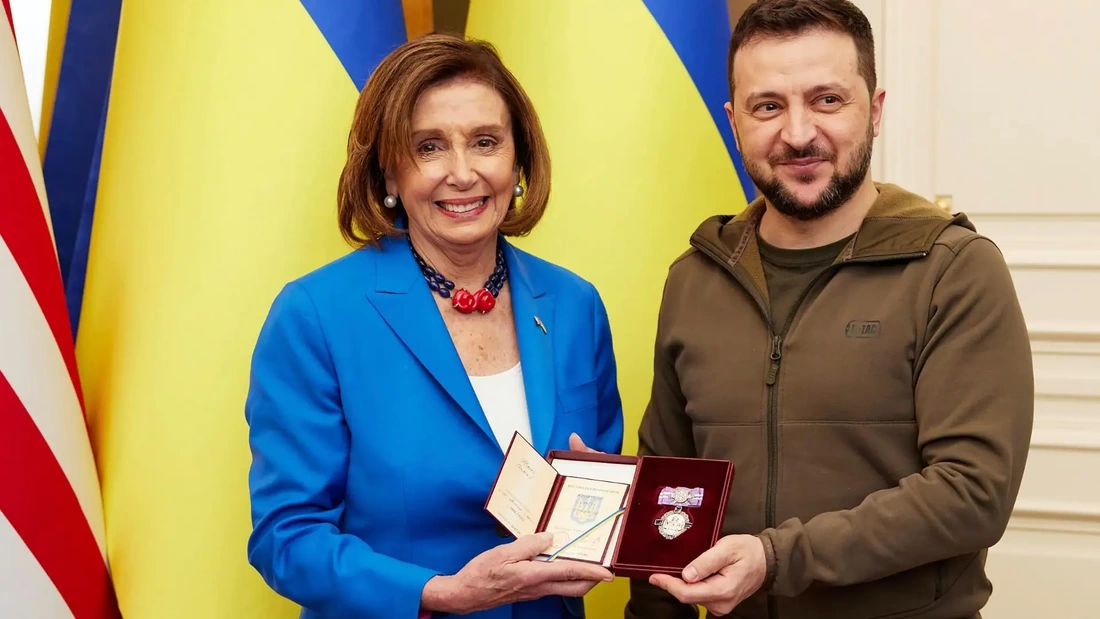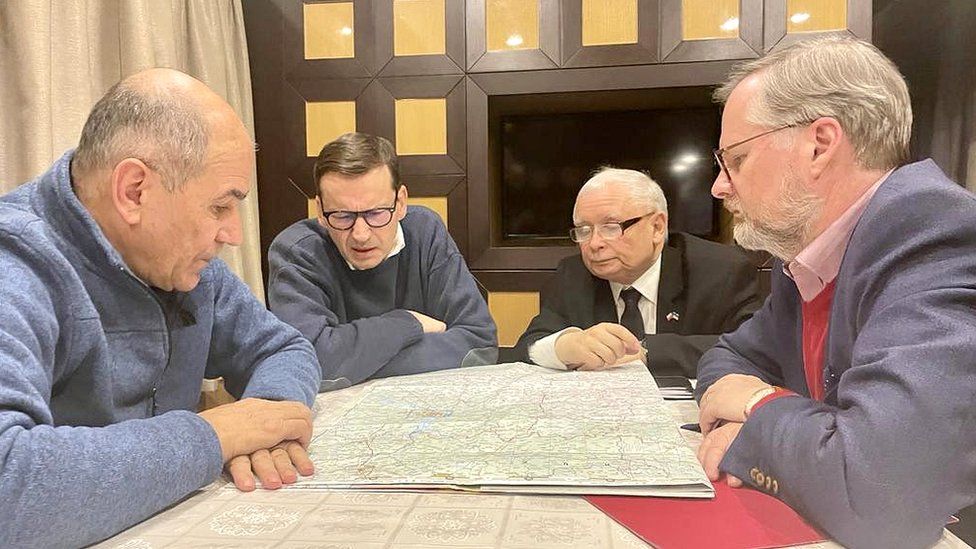
Since Russia invaded Ukraine almost three months ago, many world leaders and their representatives have made covert visits to Kyiv, meeting with President Volodymyr Zelenskyy and offering varying degrees of support. Then, without exception, they all got the hell out of Dodge. This made me wonder--what if some of them didn’t leave? What if they chose to stay in Kyiv or move to other high-conflict regions such as Mariupol or Odesa?
I first came across the term “Peace Hostage” in Arthur C. Clarke’s 1998 science fiction novel “3001: The Final Odyssey.” In this story, Astronaut Frank Poole, presumed dead after unsuccessfully plotting against the sentient but paranoid supercomputer HAL 9000 back in the year 2001, awakens one thousand years later. When Poole gets around to catching up on all the Earth’s history he skipped, he learns this about the early 21st-century:
“No statesman, no idealist of any persuasion invented the 'Peace Hostage' movement; the very name was not coined until well after someone had noticed that at any given moment there were a hundred thousand Russian tourists in the United States - and half a million Americans in the Soviet Union, most of them engaged in their traditional pastime of complaining about the plumbing. And perhaps even more to the point, both groups contained a disproportionately large number of highly non-expendable individuals - the sons and daughters of wealth, privilege and political power. And even if one wished, it was no longer possible to plan a large-scale war.”
Mahatma Gandhi popularized this practice, with volunteers acting as “human shields”—weapons of peaceful resistance. J. Kenneth Small (Kenyon College) calls this “The Giving of Hostages,” and those hostages, “emissaries of trust.”
For various political reasons, no country (so far) has been willing or able to stand alongside Ukraine in battle. So, I propose that Clarke’s Peace Hostage idea be taken one step further. What if, in the absence of direct military assistance, sympathetic world leaders announced their upcoming Ukraine visits in advance, then remained in high-conflict areas for a while? In effect, they’d be sending Russia’s Vladimir Putin this message: “We can’t/won’t join this conflict, but if you’re going to attack civilians, we’ll be among them.” It’s a heck of a dare requiring a great deal of courage, but we’d quickly see if Putin would blink.
Peace hostages could work in overlapping shifts, so there’s always at least one “highly non-expendable individual” present in each high-conflict region. Said individuals wouldn’t necessarily have to be another country’s leader, just someone non-expendable-enough (such as an ambassador or oligarch) to make Putin think twice before ordering the next attack. An effective peace hostage would need to be a person (or a group of people) who causes Putin to think twice, or perhaps make one of his generals to question their orders. “Comrade President, do you really want me to keep bombing Odesa? The German ambassador and her staff just moved in to the top floor of the Odesa Hilton!”
Perhaps the United Nations Security Council—so far ineffectual in this conflict—could be tasked with drawing up a Peace Hostage Schedule, e.g. “Okay, from the 1st to the 15th, France, you’ve got Kyiv, Great Britain gets Mariupol, and Germany has Odesa. From the 15th to the 30th, Canada, you’ve got Kyiv…”
Ukraine’s President Zelenskyy has demonstrated remarkable courage during this conflict. He strikes me as a man who, had Russia not invaded Ukraine but a neighbouring eastern-bloc country, would have offered himself up as a peace hostage if he thought it would prevent further conflict. Will the leader of any country step up and do the same for him?
#PeaceHostage
#StandWithUkraine
I first came across the term “Peace Hostage” in Arthur C. Clarke’s 1998 science fiction novel “3001: The Final Odyssey.” In this story, Astronaut Frank Poole, presumed dead after unsuccessfully plotting against the sentient but paranoid supercomputer HAL 9000 back in the year 2001, awakens one thousand years later. When Poole gets around to catching up on all the Earth’s history he skipped, he learns this about the early 21st-century:
“No statesman, no idealist of any persuasion invented the 'Peace Hostage' movement; the very name was not coined until well after someone had noticed that at any given moment there were a hundred thousand Russian tourists in the United States - and half a million Americans in the Soviet Union, most of them engaged in their traditional pastime of complaining about the plumbing. And perhaps even more to the point, both groups contained a disproportionately large number of highly non-expendable individuals - the sons and daughters of wealth, privilege and political power. And even if one wished, it was no longer possible to plan a large-scale war.”
Mahatma Gandhi popularized this practice, with volunteers acting as “human shields”—weapons of peaceful resistance. J. Kenneth Small (Kenyon College) calls this “The Giving of Hostages,” and those hostages, “emissaries of trust.”
For various political reasons, no country (so far) has been willing or able to stand alongside Ukraine in battle. So, I propose that Clarke’s Peace Hostage idea be taken one step further. What if, in the absence of direct military assistance, sympathetic world leaders announced their upcoming Ukraine visits in advance, then remained in high-conflict areas for a while? In effect, they’d be sending Russia’s Vladimir Putin this message: “We can’t/won’t join this conflict, but if you’re going to attack civilians, we’ll be among them.” It’s a heck of a dare requiring a great deal of courage, but we’d quickly see if Putin would blink.
Peace hostages could work in overlapping shifts, so there’s always at least one “highly non-expendable individual” present in each high-conflict region. Said individuals wouldn’t necessarily have to be another country’s leader, just someone non-expendable-enough (such as an ambassador or oligarch) to make Putin think twice before ordering the next attack. An effective peace hostage would need to be a person (or a group of people) who causes Putin to think twice, or perhaps make one of his generals to question their orders. “Comrade President, do you really want me to keep bombing Odesa? The German ambassador and her staff just moved in to the top floor of the Odesa Hilton!”
Perhaps the United Nations Security Council—so far ineffectual in this conflict—could be tasked with drawing up a Peace Hostage Schedule, e.g. “Okay, from the 1st to the 15th, France, you’ve got Kyiv, Great Britain gets Mariupol, and Germany has Odesa. From the 15th to the 30th, Canada, you’ve got Kyiv…”
Ukraine’s President Zelenskyy has demonstrated remarkable courage during this conflict. He strikes me as a man who, had Russia not invaded Ukraine but a neighbouring eastern-bloc country, would have offered himself up as a peace hostage if he thought it would prevent further conflict. Will the leader of any country step up and do the same for him?
#PeaceHostage
#StandWithUkraine



 RSS Feed
RSS Feed